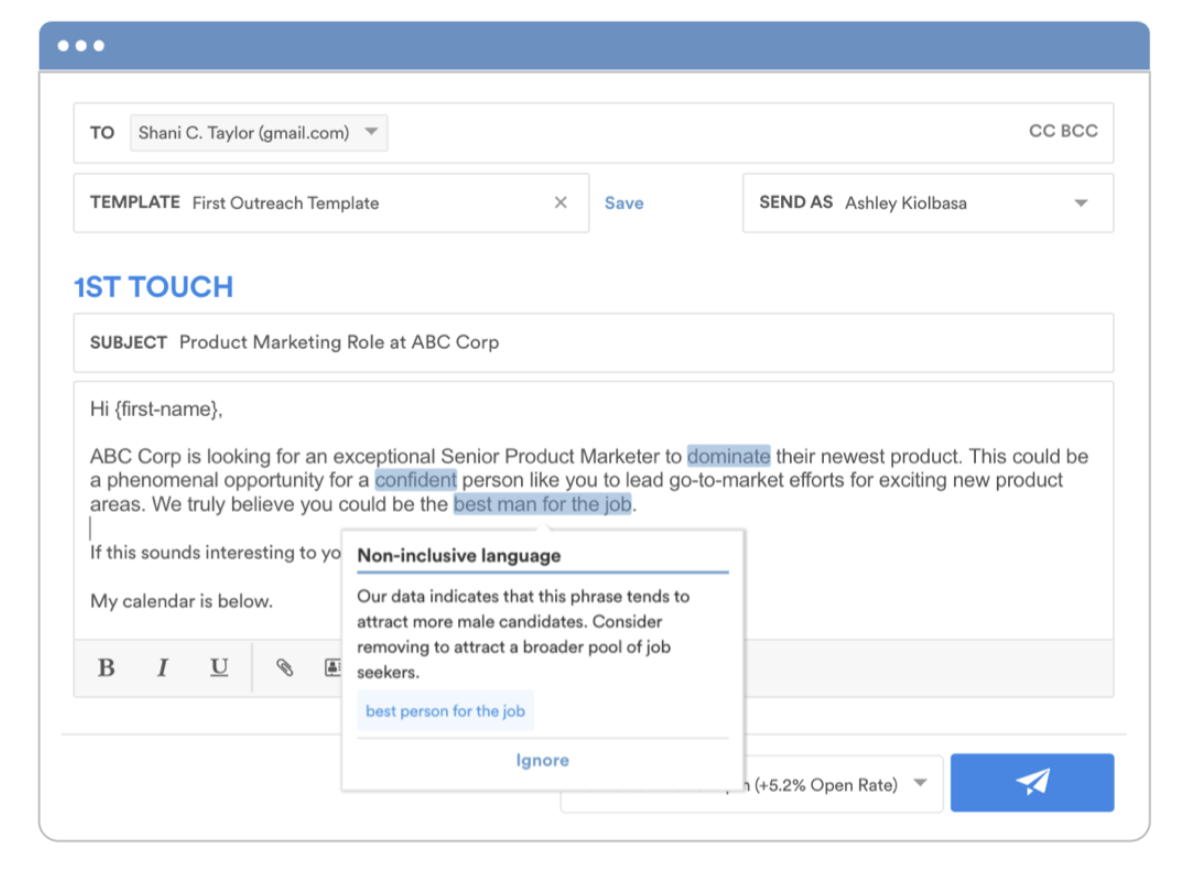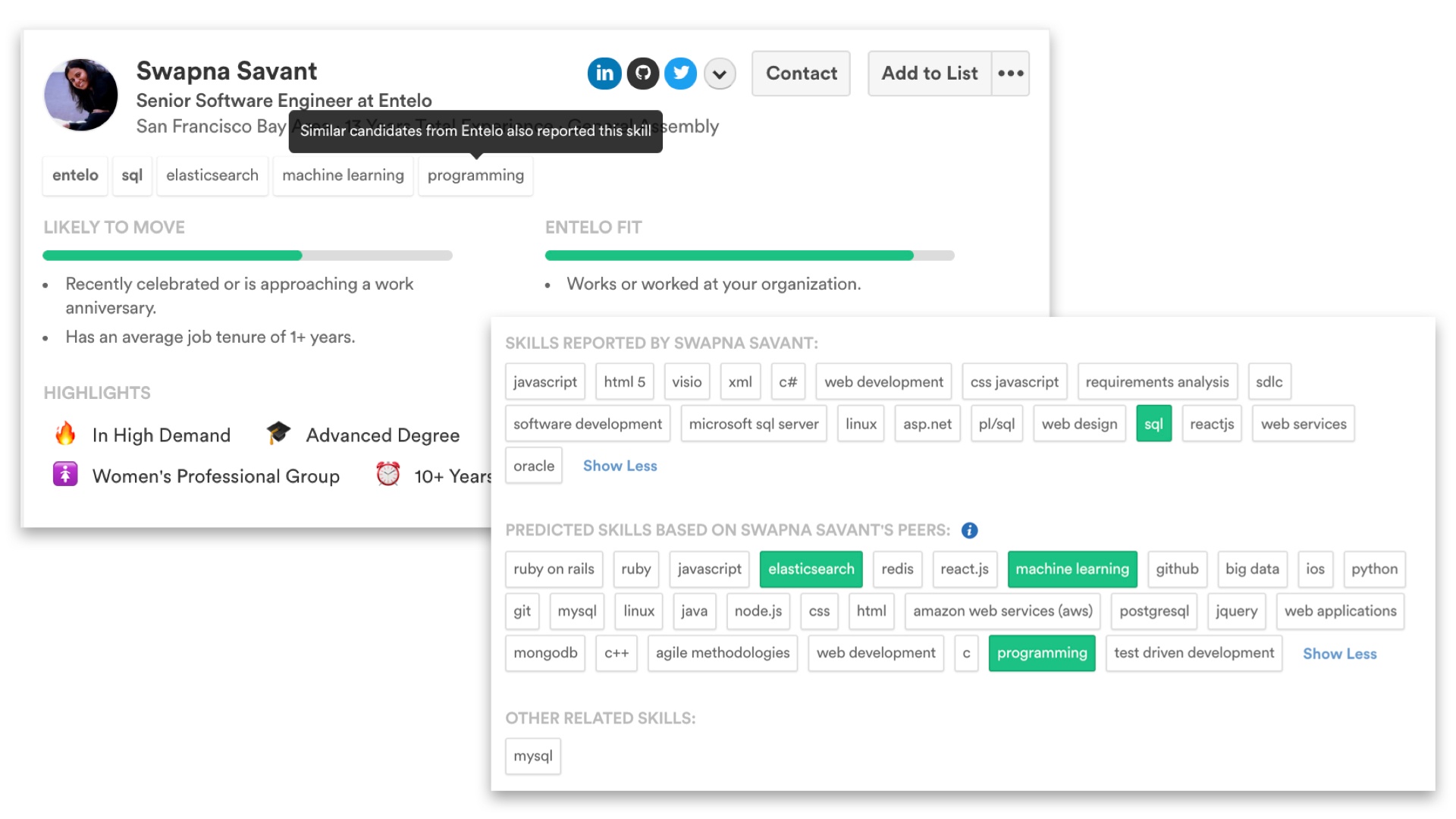.jpg?width=831&name=Untitled%20design%20(9).jpg)
At Entelo, we firmly believe diversity is the true foundation of all great companies. We also believe there is much more technology can do to help organizations build this foundation. That’s why we spent countless hours interviewing recruiters, picking the brains of industry leaders, and facilitating discussion panels to understand the biggest D&I challenges facing talent organizations. These conversations helped us to better identify the obstacles keeping recruiting teams from reaching their D&I goals and ultimately develop new functionality to solve for these pain points.
Today we are excited to announce four new additions to Entelo’s diversity toolkit: Diverse Pipeline Reports, Diversity Highlights, Inclusive Language Insights, and Peer-Based Skills.
Measure what matters: Diverse Pipeline Reports
This December large tech companies are expected to disclose workforce diversity numbers, and although the data isn’t out yet, it’s likely that once again these reports will reveal little progress in hiring underrepresented groups.
While there are many reasons why it’s so hard to achieve the desired workforce representation, it is particularly challenging to move the needle forward when you lack clear visibility into the composition of your candidate pipeline. As Peter Drucker said, “If you can’t measure it, you can’t manage it.”
Entelo addresses this problem by offering diversity reports that allow recruiters to gain insight via a complete breakdown of your funnel by gender and ethnicity for candidates that you’ve taken an action on or engaged with on Entelo’s platform. Reports are customizable and allow you to track progress over time.
 These new diversity reports from Entelo can help your team’s good faith diversity efforts in the case of an OFCCP audit, by allowing you to track and demonstrate the number of diversity searches performed and the ratio of underrepresented candidates in your pipeline.
These new diversity reports from Entelo can help your team’s good faith diversity efforts in the case of an OFCCP audit, by allowing you to track and demonstrate the number of diversity searches performed and the ratio of underrepresented candidates in your pipeline.
Understand what diversity means to your hiring needs
Diversity is more than just race and gender. A wide range of other factors contribute to building truly diverse teams, including communication style, education, life experiences, military status, or even belonging to certain communities.
Leveraging self-reported data, Entelo allows recruiters to quickly discover candidates with multifaceted dimensions of diversity such as belonging to diverse professional groups, volunteer experience, or even experience running D&I initiatives.

Use inclusive language in your outreach
Inclusive language is a crucial part of the equation that helps create a sense of belonging and improves the experience of underrepresented groups. Unfortunately, even with the best of intentions, we can unconsciously use words that might not resonate with certain groups. As a result, the lack of neutral language can alienate some candidates.
Entelo’s data science team studied the frequency with which recruiters use terms and phrases deemed to be gender biased and the impact of such language on response rates. After examining over 1.5 million recruiting emails sent through Entelo Track, our data science team discovered that 28% of emails contained biased language, and as usage of gender-biased language increased, response rates decreased comparably.
To ensure that recruiters use gender-neutral language, Entelo Track now highlights non-inclusive terms when composing an email and provides suggestions for more inclusive terms.

Think beyond what’s listed on the resume
The “pipeline problem” is a popular explanation for why the tech industry isn’t diverse. While it’s a fact that there are fewer women than men earning computer science degree, we believe that there are things we can do to correct the perceived scarcity of female candidates.
Resumes are often poor predictors of candidates' qualifications, especially for tech roles. For software engineering roles specifically, there is often very little correspondence between what a candidate writes about themselves and whether they are actually qualified for the job.
On average, female candidates list 16% fewer keywords in their profiles compared to male candidates with the same level of experience in similar roles. Therefore, systems that rely on keyword searches are inherently biased towards male profiles and will yield a limited pool of female candidates.
Entelo’s proprietary 'Peer-Based Skills' algorithm corrects for that bias by surfacing qualified female candidates, even if they have not explicitly listed those skills on their social profiles. Unlike other AI systems, Entelo eliminates bias throughout the recruiting process, both in how candidates represent themselves and how recruiters perceive them helping to solve the “pipeline problem.”
 For a more technical breakdown of the engineering work behind these features, check out this post from Software Engineer Kelly Hale who led the development of D&I features.
For a more technical breakdown of the engineering work behind these features, check out this post from Software Engineer Kelly Hale who led the development of D&I features.
At Entelo we are constantly looking for new ways to help companies achieve Diversity & Inclusion goals. What D&I practices are working for you? Let us know in the comments below.
